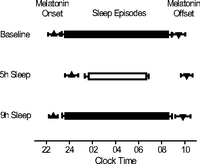Impact of insufficient sleep on total daily energy expenditure, food intake, and weight gain
- Rachel R. Markwalda,b,1,
- Edward L. Melansonb,c,
- Mark R. Smitha,
- Janine Higginsd,
- Leigh Perreaultb,
- Robert H. Eckelb, and
- Kenneth P. Wright, Jr.a,b,2
- aSleep and Chronobiology Laboratory, Department of Integrative Physiology, University of Colorado, Boulder, CO 80309;
- bDivision of Endocrinology, Metabolism, and Diabetes,
- cDivision of Geriatric Medicine, and
- dDepartment of Pediatrics, University of Colorado Anschutz Medical Campus, Aurora, CO 80045
-
Edited by Joseph S. Takahashi, Howard Hughes Medical Institute, University of Texas Southwestern Medical Center, Dallas, TX, and approved February 6, 2013 (received for review September 28, 2012)
Abstract
Insufficient sleep is associated with obesity, yet little is known about how repeated nights of insufficient sleep influence energy expenditure and balance. We studied 16 adults in a 14- to 15-d-long inpatient study and quantified effects of 5 d of insufficient sleep, equivalent to a work week, on energy expenditure and energy intake compared with adequate sleep. We found that insufficient sleep increased total daily energy expenditure by ∼5%; however, energy intake—especially at night after dinner—was in excess of energy needed to maintain energy balance. Insufficient sleep led to 0.82 ± 0.47 kg (±SD) weight gain despite changes in hunger and satiety hormones ghrelin and leptin, and peptide YY, which signaled excess energy stores. Insufficient sleep delayed circadian melatonin phase and also led to an earlier circadian phase of wake time. Sex differences showed women, not men, maintained weight during adequate sleep, whereas insufficient sleep reduced dietary restraint and led to weight gain in women. Our findings suggest that increased food intake during insufficient sleep is a physiological adaptation to provide energy needed to sustain additional wakefulness; yet when food is easily accessible, intake surpasses that needed. We also found that transitioning from an insufficient to adequate/recovery sleep schedule decreased energy intake, especially of fats and carbohydrates, and led to −0.03 ± 0.50 kg weight loss. These findings provide evidence that sleep plays a key role in energy metabolism. Importantly, they demonstrate physiological and behavioral mechanisms by which insufficient sleep may contribute to overweight and obesity.
Footnotes
-
↵1Present address: Naval Health Research Center, San Diego, CA 92106.
- ↵2To whom correspondence should be addressed. E-mail: kenneth.wright{at}colorado.edu.
-
Author contributions: R.R.M., E.L.M., M.R.S., J.H., L.P., R.H.E., and K.P.W. designed research; R.R.M., E.L.M., M.R.S., J.H., L.P., and K.P.W. performed research; R.R.M., E.L.M., M.R.S., J.H., and K.P.W. analyzed data; and R.R.M., E.L.M., M.R.S., J.H., L.P., R.H.E., and K.P.W. wrote the paper.
-
Conflict of interest statement: There are no conflicts of interest directly related to this project. L.P. has received speakers fees from Merck. R.H.E. has current funding through a Sanofi research grant (fellowship–education grant), Diadexus, and GlaxoSmithKline, and also serves as a consultant for the following: Amylin, GTC Nutrition, Genfit, Lilly, Pfizer, Johnson & Johnson, and Esperion. Additionally, R.H.E. has financial and/or material support with the following: Cardiometabolic Health Congress, Vindico (honorarium), Metabolic Syndrome Institute, CME Incite (honorarium), Voxmedia (honorarium). K.P.W. serves as a consultant for Takeda Pharmaceuticals and Zeo, Inc. K.P.W. is chair of the Scientific Advisory Board and has stock options at Zeo, Inc. and has received honoraria from Potomac Center for Medical Education, the Associated Professional Sleep Societies, and the National Institutes of Health.
-
This article is a PNAS Direct Submission.
-
This article contains supporting information online at www.pnas.org/lookup/suppl/doi:10.1073/pnas.1216951110/-/DCSupplemental.








